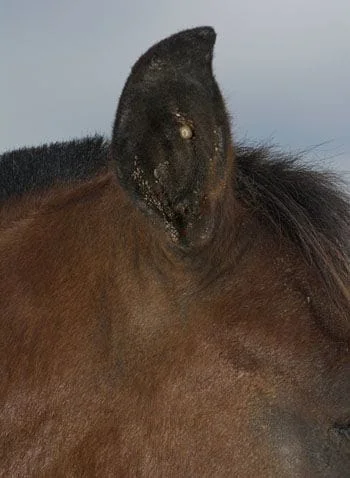Parasites in horses can result in numerous equine health issues. Infected horses can exhibit weight loss, diarrhea, and colic. There are many different types of parasites but the ones that show the most present are strongyles and ascarid.
The Parasites
Horses acquire these common parasites by grazing pasture covered with worm larvae. They ingest the grass and, inadvertently, the immature worms. The larvae travel through the horse’s gastrointestinal system.
Large and small strongyles in adult form live in the large intestine. Adult strongyles produce eggs that are passed out in the manure. These eggs then develop into larvae that infect pastures. These larvae are very resistant to harsh environmental conditions because of a protective sheath. Strongyles can survive in a freezing environment, but a hot and dry environment will often kill them.
Ascarids in foals and can be particularly dangerous. Worms, acquired via grazing, can penetrate through the gut wall and migrate to the liver and/or lungs. Horses often cough them up before swallowing them, where the ascarids then develop into adults in the gastrointestinal system. Because these ascarids can migrate to the lungs, infected horses could show respiratory signs, such as cough or nasal discharge.
Bot Flies lay small yellow eggs on horses’ legs and coats. Horses ingest these eggs when they itch or groom each other. The eggs molt to the larval stage in the horse’s mouth before migrating to the stomach, where they attach to the gut lining. They don’t usually cause significant health problems but can lead to stomach ulcers.
Pinworms The most common clinical sign of pinworm infection in a horse is continuous tail-rubbing. Pinworms live in the horse’s rectum and only exit to lay eggs around the perineum. This makes the horse particularly itchy in that area.
Tapeworms There are several species of tapeworm, each of which can colonize a different part of your horse’s gut. The most common tapeworm, Anplocephala perfoliata, can cause impactions at the ileocecal junctions. Affected horses can show signs of colic, unthriftiness, and anemia. Horses can also develop ulcers where tapeworms attach to the gut’s inner lining. Tapeworms also require an intermediate host: the mite. When horses pass tapeworm eggs in feces (a sporadic occurrence) the mites ingest the eggs. Then, your horse can inadvertently ingest the mites when grazing pasture or eating hay.
The Solution
Prevention is key! Commonly used strategies for parasite control in adult horses are based largely on knowledge and concepts that are more than 50 years old. This development necessitates a re-examination of recommendations for parasite control. Decades of frequent de-wormering use have selected for high levels of drug resistance. In order to control theses parasites, a Fecal egg count should be preformed at least twice a year. One when the parasites become active(Spring); and one a couple weeks after the specific de-wormer has been administered. l. The results from the FEC (Fecal Egg Count) will help us determine what kind parasites your horse has and the amount present so we can recommend which dewormer should be administered. For horses shedding low numbers of parasite eggs, your vet will most likely recommend deworming only twice a year. For high-shedding horses, more frequent deworming might be required.
It is important to be aware that some worm eggs—such as tapeworm, encysted small strongyles, pinworms, and bots—do not always show up on a fecal egg count.
You can also help prevent parasites by routinely picking up manure,chain harrowing the fields, rotating turn out, and maintaining good hygiene in the barn.



